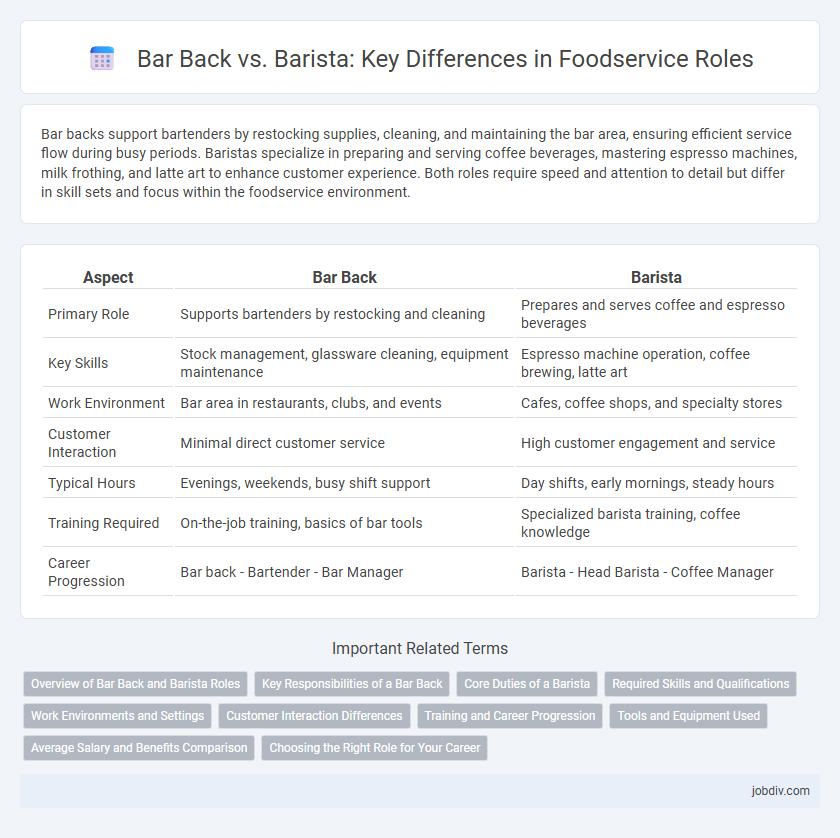Bar backs support bartenders by restocking supplies, cleaning, and maintaining the bar area, ensuring efficient service flow during busy periods. Baristas specialize in preparing and serving coffee beverages, mastering espresso machines, milk frothing, and latte art to enhance customer experience. Both roles require speed and attention to detail but differ in skill sets and focus within the foodservice environment.
Table of Comparison
| Aspect | Bar Back | Barista |
|---|---|---|
| Primary Role | Supports bartenders by restocking and cleaning | Prepares and serves coffee and espresso beverages |
| Key Skills | Stock management, glassware cleaning, equipment maintenance | Espresso machine operation, coffee brewing, latte art |
| Work Environment | Bar area in restaurants, clubs, and events | Cafes, coffee shops, and specialty stores |
| Customer Interaction | Minimal direct customer service | High customer engagement and service |
| Typical Hours | Evenings, weekends, busy shift support | Day shifts, early mornings, steady hours |
| Training Required | On-the-job training, basics of bar tools | Specialized barista training, coffee knowledge |
| Career Progression | Bar back - Bartender - Bar Manager | Barista - Head Barista - Coffee Manager |
Overview of Bar Back and Barista Roles
Bar backs support bartenders by restocking supplies, cleaning glassware, and maintaining the bar area to ensure smooth operations during busy shifts. Baristas specialize in crafting espresso-based beverages, managing coffee equipment, and delivering personalized customer service in coffeehouse environments. Both roles are essential in foodservice, with bar backs focusing on efficiency behind the bar and baristas emphasizing beverage preparation and customer interaction.
Key Responsibilities of a Bar Back
Bar Backs support bartenders by maintaining the bar's cleanliness, restocking supplies, and managing inventory to ensure smooth service during peak hours. They clear glasses, assist with basic drink preparation, and replenish ice, garnishes, and liquor, supporting efficient workflow behind the bar. Their role is essential in maintaining bar organization and enabling bartenders to focus on customer service and complex drink mixing.
Core Duties of a Barista
Baristas specialize in crafting high-quality espresso-based beverages, ensuring precise brewing techniques and maintaining optimal coffee machine performance. They handle ingredient preparation, create latte art, and engage customers with product knowledge to enhance the overall cafe experience. While bar backs support bar operations by restocking supplies and cleaning, baristas focus on direct beverage preparation and personalized customer service.
Required Skills and Qualifications
Bar backs must possess strong multitasking abilities, physical stamina, and knowledge of bar equipment and drink preparation to support bartenders efficiently. Baristas require expert coffee-making skills, familiarity with espresso machines, and a strong customer service orientation to craft high-quality beverages and engage patrons. Both roles demand excellent communication skills and the ability to work swiftly in fast-paced foodservice environments.
Work Environments and Settings
Bar backs typically work in fast-paced bars, nightclubs, and pubs where they support bartenders by restocking supplies and maintaining cleanliness during peak hours. Baristas operate in coffee shops, cafes, and specialty coffee bars, focusing on preparing coffee beverages and engaging with customers in more relaxed, daytime settings. Both roles require multitasking but cater to distinct atmospheres and customer experiences within the foodservice industry.
Customer Interaction Differences
Bar backs primarily support bartenders by restocking supplies, clearing glasses, and maintaining cleanliness, resulting in minimal direct customer interaction. Baristas engage directly with customers by taking orders, customizing beverages, and providing personalized recommendations, fostering a more interactive and social experience. The distinct customer engagement roles reflect the operational focus of each position within foodservice environments.
Training and Career Progression
Bar backs receive focused training on inventory management, glassware handling, and drink preparation support, serving as essential entry-level roles in foodservice establishments. Baristas undergo specialized education in coffee brewing techniques, espresso machine operation, and customer service skills, often leading to advanced positions such as head barista or cafe manager. Career progression for bar backs typically involves moving up to bartending roles, while baristas can advance towards roles in specialty coffee, training, or shop ownership.
Tools and Equipment Used
Bar backs rely heavily on essential tools like speed rails, kegerators, and glass racks to maintain efficient bar operations, while baristas use espresso machines, coffee grinders, and milk frothers to craft specialty coffee beverages. The bar back's equipment supports rapid beverage replenishment and cleanliness, whereas baristas utilize precise instruments designed for coffee extraction and presentation. Mastery of specific tools directly impacts speed and quality in both roles within the foodservice industry.
Average Salary and Benefits Comparison
Bar backs typically earn an average salary ranging from $25,000 to $35,000 per year, whereas baristas usually make between $22,000 and $30,000 annually. Bar backs often receive benefits such as employee meals, tips, and sometimes health insurance depending on the establishment, while baristas commonly gain access to flexible scheduling, paid training, and similar tip opportunities. Both roles may include incentives like performance bonuses and staff discounts, varying by employer and location.
Choosing the Right Role for Your Career
Bar backs support bartenders by restocking supplies, maintaining cleanliness, and handling basic customer service, making it ideal for those seeking fast-paced, teamwork-oriented environments. Baristas focus on crafting high-quality coffee drinks with precision and customer interaction, suited for individuals passionate about coffee culture and developing specialized skills. Selecting the right role depends on your career goals, whether you prefer behind-the-scenes support in busy bars or front-line engagement in specialty cafes.
Bar Back vs Barista Infographic

 jobdiv.com
jobdiv.com